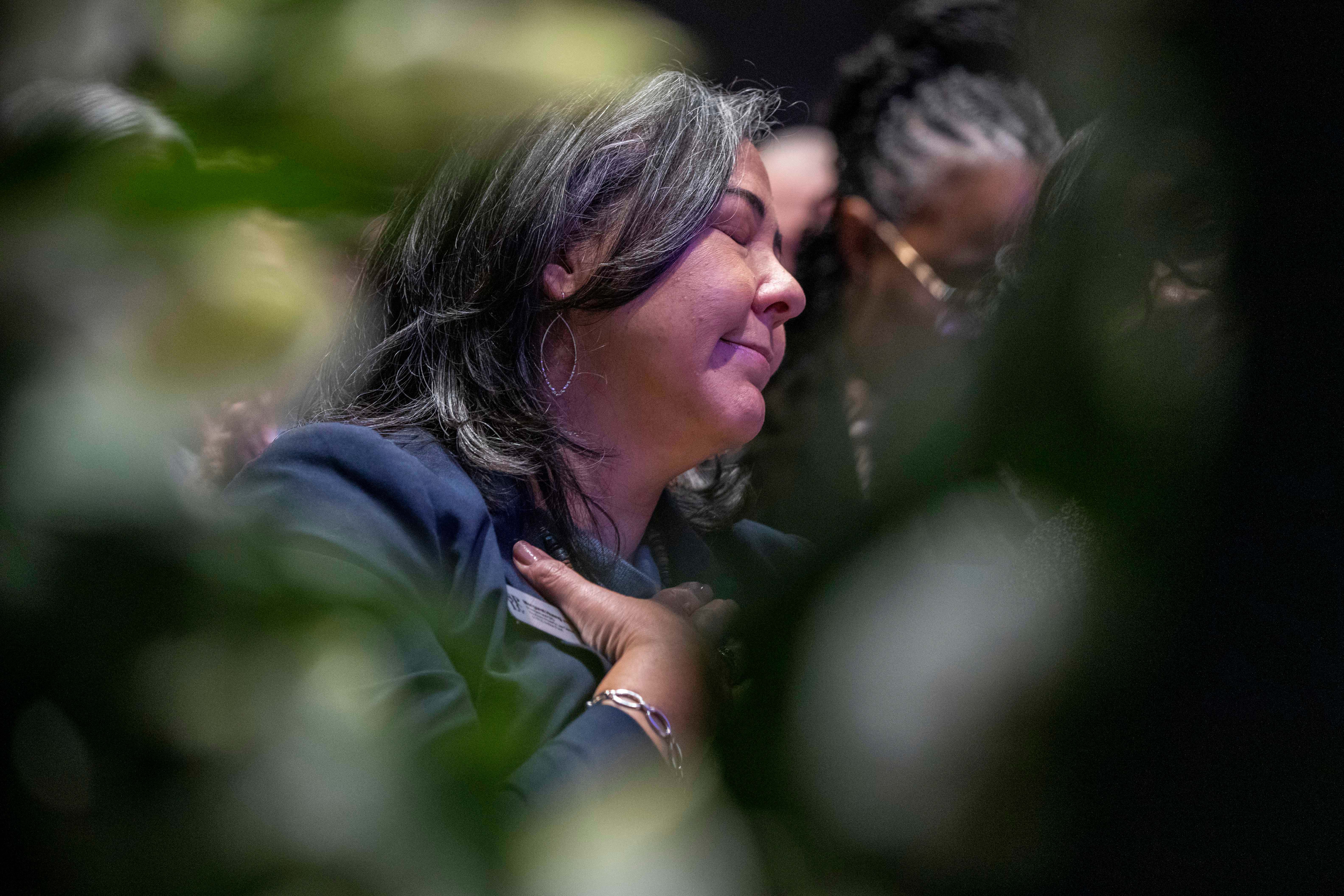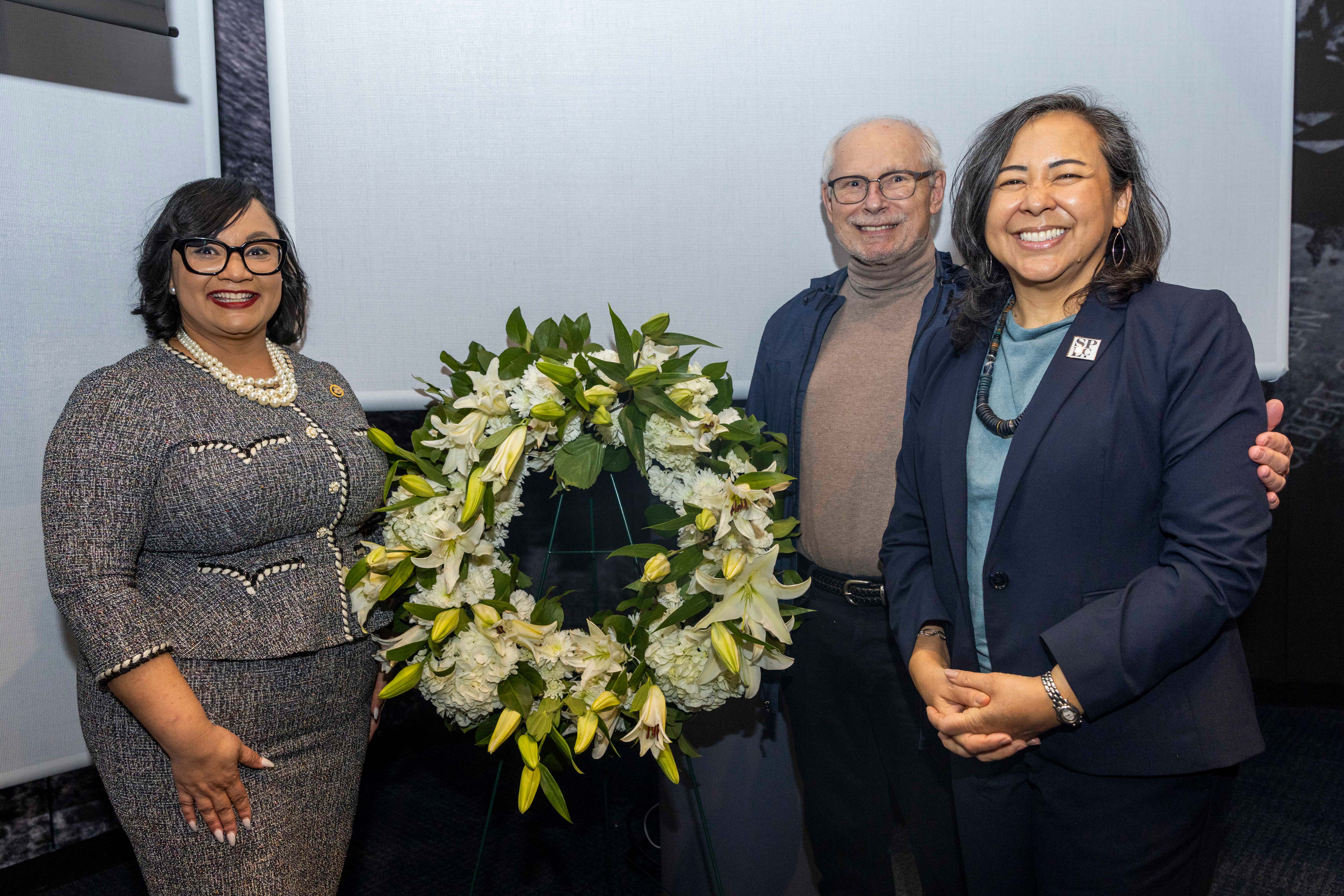Congresswoman, activists honor martyrs at Civil Rights Memorial Center
Fifty-nine years ago, Jimmie Lee Jackson joined a peaceful march in Marion, Alabama, just outside Selma, the epicenter of the 1960s voting rights movement. The 26-year-old was among thousands across the South who were standing up against Jim Crow in the face of certain violence and intimidation.
His death eight days later – after he was clubbed and shot in the stomach by state troopers who confronted the 200 marchers on the night of Feb. 18, 1965 – helped catalyze the Selma-to-Montgomery March the following month and the passage of the Voting Rights Act (VRA) later that year.
Not long after President Lyndon B. Johnson signed the VRA into law, Jackson’s grandfather headed to the polls to cast a vote for the first time in his life, at 84 years old.
Earlier today, Southern Poverty Law Center President and CEO Margaret Huang recounted Jackson’s story to a crowd of advocates and supporters who gathered inside the SPLC’s Civil Rights Memorial Center theater in Montgomery, Alabama, to honor 40 civil rights martyrs, including Jackson, whose names are inscribed on the Civil Rights Memorial’s circular granite table, which is in a public space just outside the Center.
In the video: Ceremony paying tribute to 40 civil rights martyrs on Friday, March 1, 2024, at the Civil Rights Memorial Center.
The SPLC dedicated the site in 1989 to honor martyrs who died at the height of the Civil Rights Movement, between the 1954 U.S. Supreme Court school desegregation decision in Brown v. Board of Education and the assassination of Martin Luther King Jr. in 1968.
Typically, a flowered wreath would be laid on the Memorial. But this year, heavy rain brought visitors inside the Center, allowing them to learn more about the martyrs and how their deaths propelled the movement forward.
“Because they raised their voices, because they took to the streets, because they organized Black voters, and because they worked to demand their rights, their lives were taken far too early,” Huang said. “But none of them died in vain.
“As Dr. King said at Mr. Jackson’s memorial service: ‘Jimmie Lee’s death says to us that we must work passionately and unrelentingly to make the American dream a reality.’ That call is as urgent today as it was in 1965. As we gather to honor the lives of the martyrs, I urge each of you to think about your role, your opportunity to remember their sacrifices and to live up to their call for action. Today, the march continues. The fight for justice stays alight. Each of us work passionately and unrelentingly to build the best version of America, one where all people enjoy freedom, where all people enjoy opportunity.”
Jubilee weekend
The ceremony began a weekend of activities under the banner of the Selma Bridge Crossing Jubilee, held each year to commemorate Bloody Sunday, the Selma-to-Montgomery March and the passage of the Voting Rights Act.
This year marks the third wreath-laying ceremony without U.S. Rep. John Lewis, who died in July 2020. For many years, Lewis led an annual congressional pilgrimage, sponsored by the Faith & Politics Institute, to the Memorial and historic civil rights sites in Alabama.
As a founding member and chairman of the Student Nonviolent Coordinating Committee, Lewis was a key organizer of nonviolent protests intended to desegregate restaurants, transit and other public facilities. On March 7, 1965 – the day known as Bloody Sunday – he was leading hundreds of marchers across the Selma bridge enroute to Montgomery when state troopers and sheriff’s deputies attacked them with tear gas and clubs. Lewis suffered a fractured skull. The 54-mile march was later completed on March 25, as thousands of activists from around the country, this time led by Martin Luther King Jr. and protected by the National Guard, arrived at the Capitol.
U.S. Rep. Nikema Williams, whom Georgia voters elected to Lewis’ former congressional seat, and Jerrick Lewis, executive director of the John R. Lewis Legacy Institute, joined SPLC co-founder Joseph Levin and others in attendance at the Memorial ceremony.
“Mr. Lewis said it best many times – that we’re never too young, never too old to speak up, to speak out, to find a way to get in the way,” said Williams. “This is our Civil Rights Movement. If you ever wondered what you would have done during the Civil Rights Movement, this is your opportunity to find out. There are a lot of forces trying to take us back to where we were 59 years ago, but the work that you’re doing here at the Southern Poverty Law Center, it moves us forward. It’s your turn to get in that good trouble. That’s how the march will continue.”
The ceremony concluded with a musical tribute from local singer Terrence Baldwin Jr., who performed a rendition of Sam Cooke’s “A Change Is Gonna Come.” As people exited the Center, they were handed white roses to lay on the Memorial in remembrance.
Following the Memorial event, Williams attended an SPLC-sponsored dinner reception at the Montgomery Museum of Fine Arts, along with other members of Congress including U.S. Sen. Laphonza Butler and U.S. Reps. Terri Sewell, Joe Neguse and Steven Horsford, chair of the Congressional Black Caucus. Former U.S. Sen. Doug Jones, who as a U.S. attorney prosecuted two of the Klansmen who killed four girls in a 1963 Birmingham church bombing, also attended the reception. The four girls are among the martyrs whose names are inscribed on the Memorial.
During the reception, Huang and Butler conducted a “fireside chat” about voting rights with academic and author Carol Anderson.
On Saturday, March 2, the SPLC will be in Selma to participate in two events: Restoring Hope, a conversation about pushing the city’s economic development forward, at Wallace Community College; and Building Power from the Ground Up, a panel discussion on the current state of voting rights, to be held at the St. James Hotel. The weekend will close with the crossing of the Edmund Pettus Bridge in Selma on Sunday, March 3.
Photo at top: SPLC President and CEO Margaret Huang speaks during the wreath-laying ceremony March 1, 2024, at the Civil Rights Memorial Center in Montgomery, Alabama, which kicked off the weekend's Selma Bridge Crossing Jubilee. (Credit: Alyssa Pointer)



